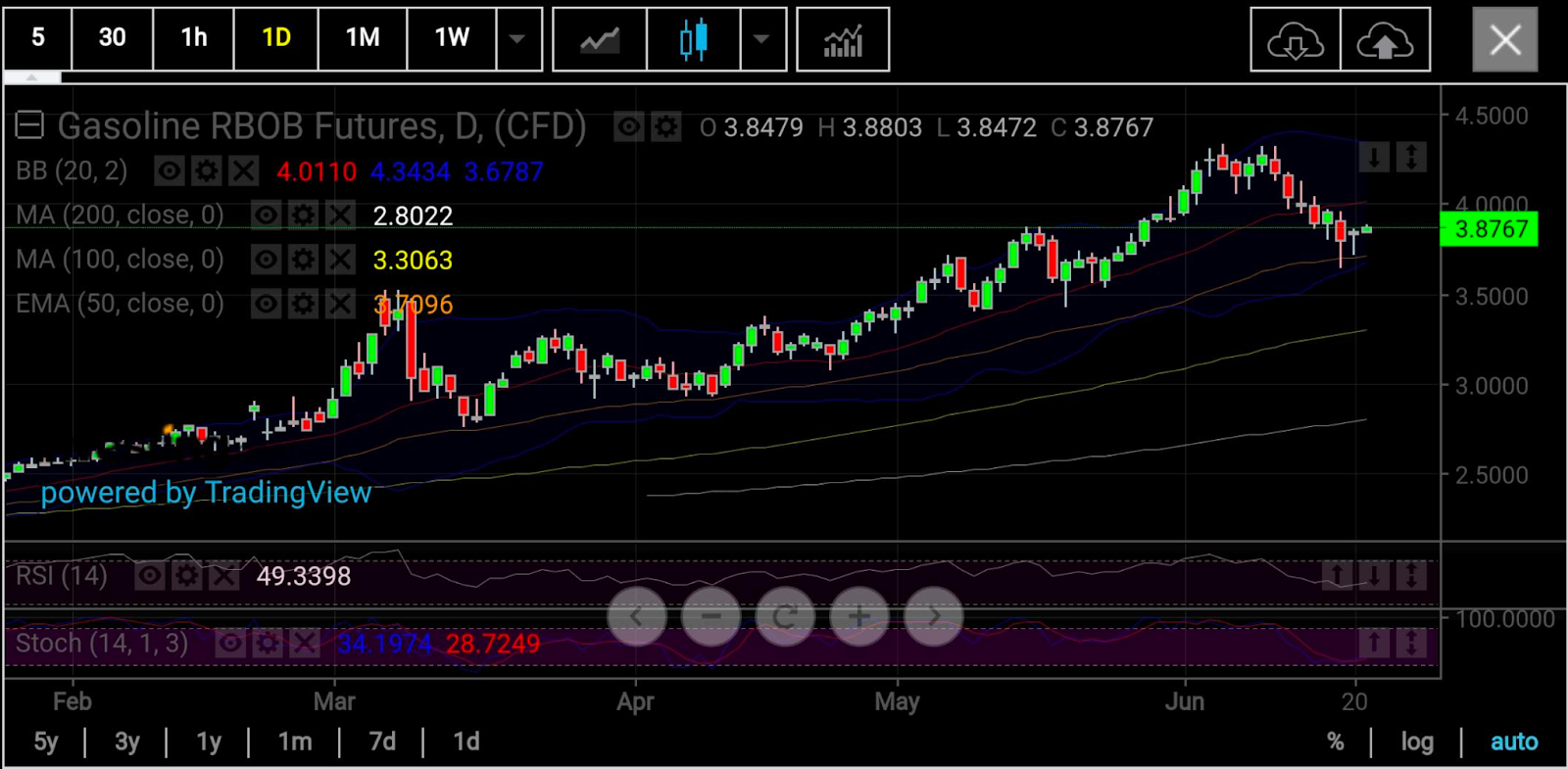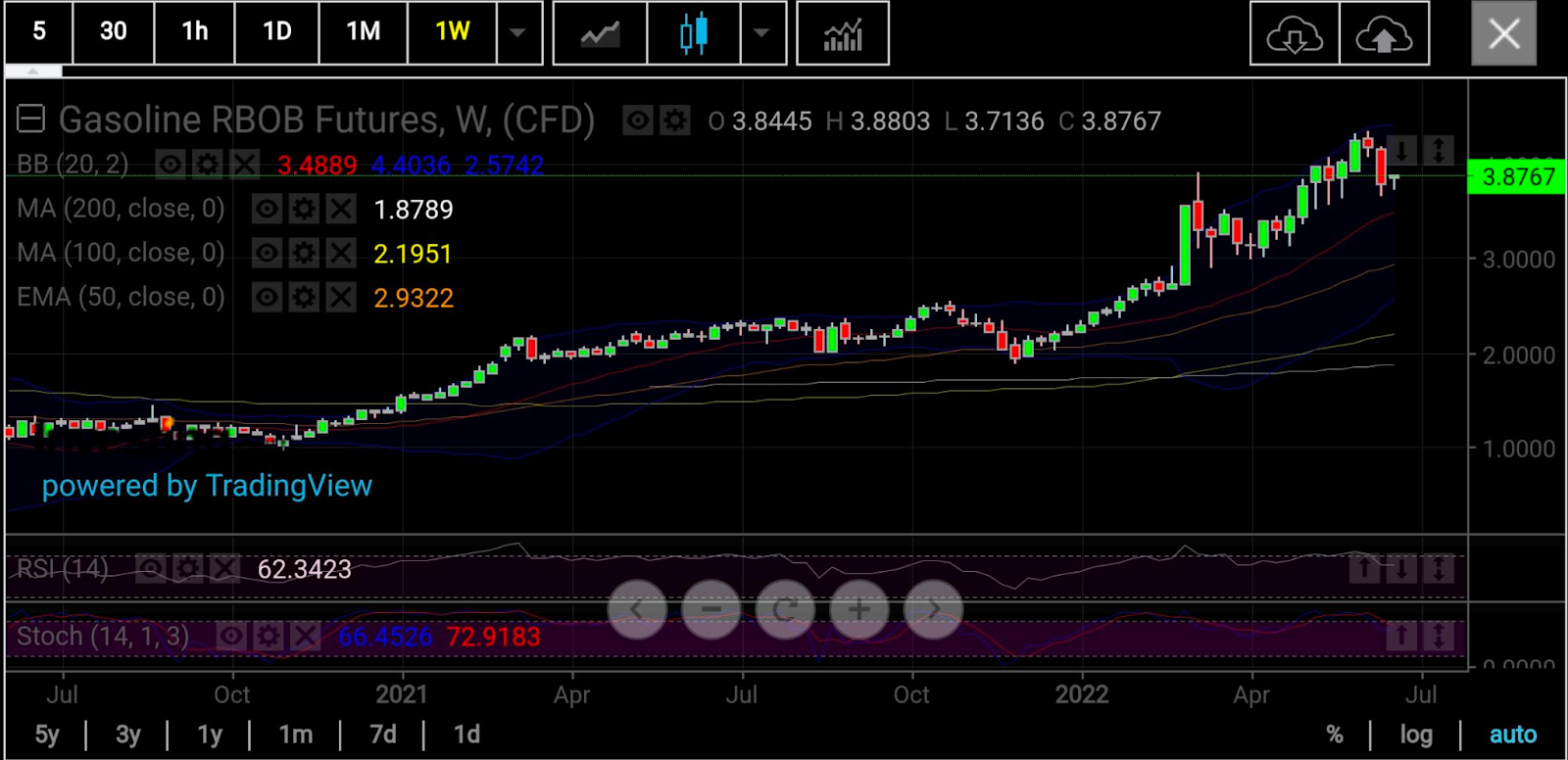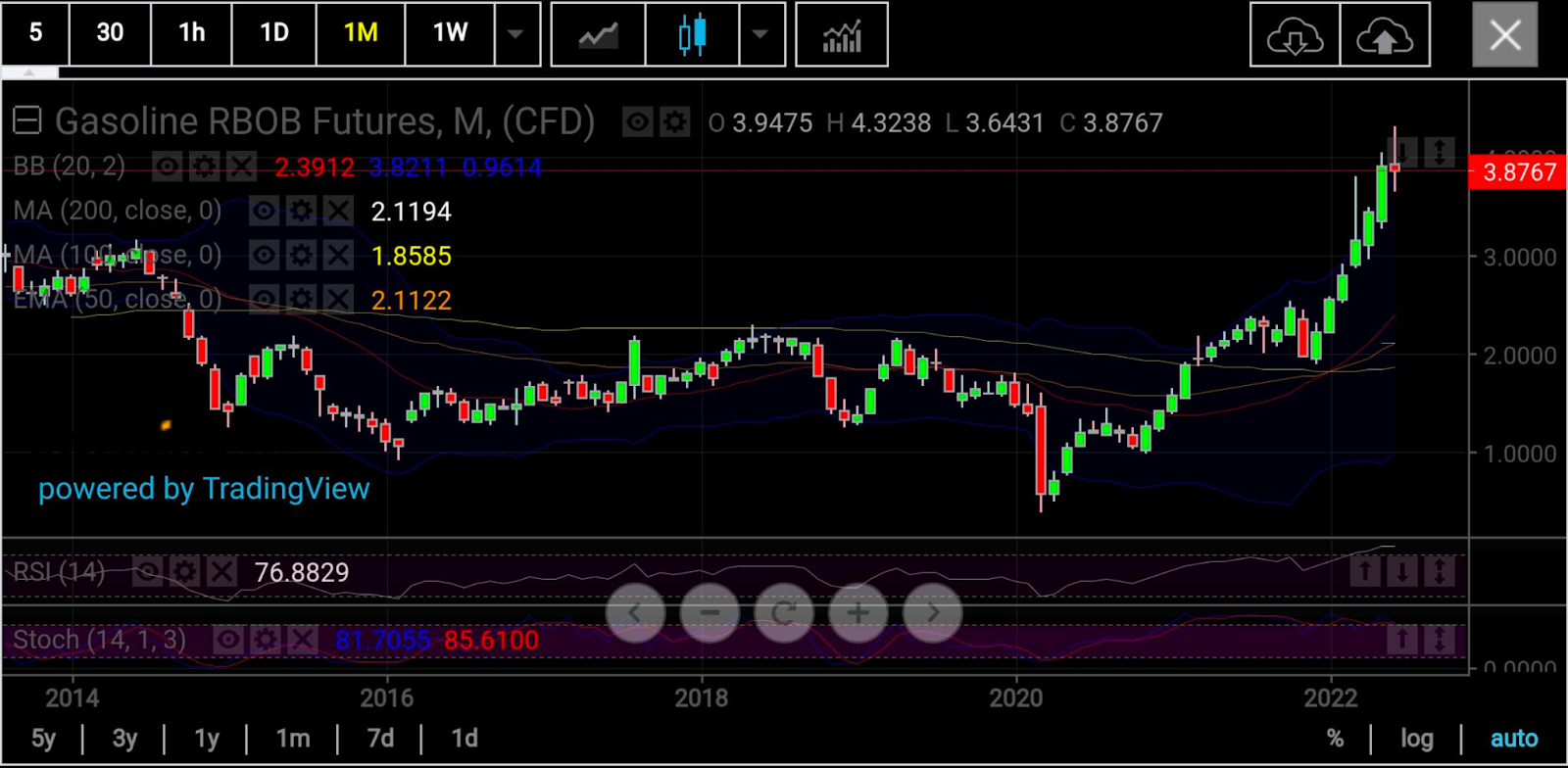Gasoline Futures Struggle To Regain Mojo As Biden Mulls Gas Tax Holiday
2022.06.21 11:41
After a 10% plunge over two weeks, New York-traded RBOB gasoline futures are up 2% so far this week—at least at the time of writing.
The rebound comes amid broadly positive energy markets as crude futures claw back some losses too from a similar shakedown the previous fortnight.
Yet, technical indicators suggest that the slide in gasoline may not be entirely over.
 Gasoline Daily
Gasoline Daily
Also, US recession concerns, which triggered the plunge of the past two weeks, are still at the core of markets, even as the supply tightness across energy liquids is helping lift their prices.
There’s also the uncertainty of a gas tax holiday being mulled by the Biden administration to cool pump prices of the fuel.
On Monday, unleaded gasoline averaged at $4.98 a gallon across the United States, down from a record-breaking $5.01 on June 13, according to the American Automobile Association. The federal government taxes gasoline at 18.3 cents per gallon and diesel fuel 24.3 cents per gallon.
A gas tax holiday would suspend those excise taxes for a certain, predetermined period of time. A number of states have already adopted or proposed a moratorium on statewide gas taxes. But so far, only a handful of state legislatures have adopted a gas tax holiday in one form or another, including Maryland, Georgia, Connecticut, New York, and Florida.
The idea has also gained traction in Congress in recent months as the costs of consumer goods like food and clothing are also on the rise, putting pressure on consumers’ pockets from multiple directions. Several different versions of a federal gas tax holiday have been proposed in both the House and the Senate—one of which would suspend the tax through the remainder of 2022—but have yet to pass both chambers.
Biden: Gasoline Tax Holiday Could Be Decided By End-Week
President Joseph Biden affirmed on Monday that it was his “hope to have a decision, based on the data I’m looking for, by the end of the week.”
Treasury Secretary Janet Yellen also said a federal gas tax holiday is “worth considering,” adding that the Biden administration was willing to work with Congress on the issue.
But others in the Biden administration have been more reserved about the possibility of a gas holiday and how it could impact revenues needed for projects like road repairs. That includes Biden’s own energy czar, Energy Secretary Jennifer Granholm.
“Part of the challenge with the gas tax, of course, is that it funds the roads, and we just did a big infrastructure bill to help fund the roads,” Granholm said on CNN’s on Sunday.
“So if we remove the gas tax, that takes away the funding that was just passed by Congress to be able to do that.”
Granholm is not the only person to warn that a federal moratorium on gas taxes could have negative, unforeseen impacts on Americans.
University of Pennsylvania’s Wharton School said in a study that many factors affect the retail prices of gasoline, including the cost of crude oil, refining and distribution costs, and profits as well as taxes.
“In the case of gas tax holiday, suppliers can capture part of the economic benefit of the tax reduction if pump prices do not fall by the full amount of the suspended tax,” the Wharton study said, adding:
“That could happen if the “demand elasticity” (consumer flexibility) for gasoline is quite low, giving suppliers more opportunity to capture the benefits of the tax cut.”
No Guarantee That Savings From Tax Reprieve Will Reach Consumers
This basically means that it’s in the hands of fuel wholesalers to pass the cost down to consumers. At present, there’s no guarantee that they will, personal finance site Kiplinger said in a blog posted on Thursday.
“There’s some concern that the oil companies wouldn’t pass along all the savings to consumers if the federal gas tax was suspended,” Kiplinger said. “The current bill in Congress addresses this issue by stating that the ‘policy of Congress’ is that ‘consumers immediately receive the benefit of the reduction in taxes’ and that ‘transportation motor fuels producers and other dealers take such actions as necessary to reduce transportation motor fuels prices to reflect such reduction.’ However, the policy has no teeth.”
Kiplinger says there’s only a weak enforcement clause that permits the US Treasury Department to “use all applicable authorities to ensure that the benefit of the reduction in taxes…is received by consumers.” There are no specific fines or other penalties for failing to abide by the law.
The Committee for a Responsible Federal Budget, meanwhile, said in a report released in February that a federal gas tax holiday could reduce gas tax revenues by up to $20 billion, depending on when and how the moratorium is enforced.
“While the gas tax holiday may reduce prices at the pump, it will further increase demand for gasoline and other goods and services at a time when the economy has little capacity to absorb it,” the committee said in part.
“The result could be even higher rates of inflation in 2023.”
Technicals Point Lower Near-Term For RBOB Gasoline
 Gasoline Weekly
Gasoline Weekly
Leaving the gasoline tax holiday aside, what do RBOB gasoline futures indicate for now?
To be sure, gasoline futures are still up almost 70% on the year and have rallied non-stop for the last seven months.
Yet, the near-term direction is pointing lower.
“The current rebound attempts we see are weak reactions to the price drop of the past two weeks, which tested a low of $3.64, after a high at $4.32, and now seeking support at the 50-Day Exponential Moving Average,” said Sunil Kumar Dixit of skcharting.com.
Stochastic readings across all major time frames—daily, weekly, and monthly—are all pointing to the downside, Dixit said.
He said the weekly middle Bollinger Band at $3.48 comes as the next immediate support, where some buyers were expected to join.
 Gasoline Monthly
Gasoline Monthly
He said the recent peak at $4.32 attracted profit booking, causing a rebalancing in the monthly overbought stochastics as momentum paused after seven months of untiring rally.
“A monthly closing below $3.28 will form a potentially bearish price reversal top that can start a mid-term correction towards the 50-week EMA of $2.93 amidst widespread volatility,” said Dixit.
On the flip side, he said, a rebound from the lows may lead to weekly closing above $4.17, followed by $4.33, which will affirm the continuation of an uptrend.
Disclaimer:








